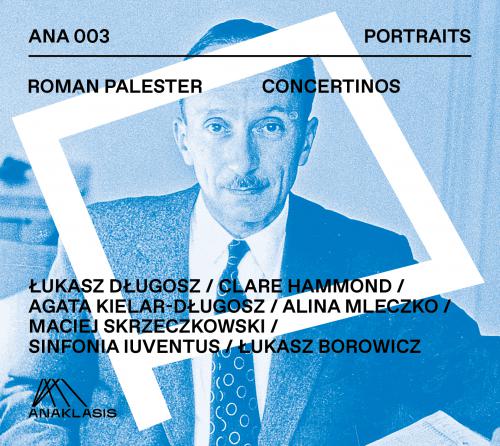NEW CD – Roman Palester CONCERTINOS
Publisher | Anaklasis – Polskie Wydawnictwo Muzyczne
Catalogue no. | ANA 003
Date | 2019
Roman Palester
Concertino for alto saxophone and string orchestra (1938/1947)
Concertino for piano and orchestra (1942)
Serenade for two flutes and string orchestra (1946)
Concertino per clavicembalo e dieci strumenti su temi di vecchie danze polacche (1955)
Performers:
Alina Mleczko – saxophone
Clare Hammond – piano
Agata Kielar-Długosz, Łukasz Długosz – flute
Maciej Skrzeczkowski – harpsichord
Jerzy Semkow Polish Sinfonia Iuventus Orchestra
Łukasz Borowicz – conductor

2019 marks the 30th anniversary of the death of Roman Palester (1907–1989), a Polish composer considered to be one of the most valuable artists of his generation, unfairly forgotten as a result of unfavourable historical circumstances. The University of Warsaw Library, as a depositary (by virtue of a will) of the great artist’s legacy, has been undertaking many activities for years to disseminate knowledge about this fascinating man and his excellent musical and journalistic achievements. Palester was one of the most talented Polish composers of the 20th century, often considered to be the “successor of Karol Szymanowski.” After 1952, he lived in exile in Munich (and later Paris), collaborating with Radio Free Europe and thereby earning his censorship in the PRL and disappearing completely from the official musical community in Poland. Despite his removal from the censored list in 1977, the composer was already non-existent in the minds of his compatriots and performances of his works are still few and far between today. There are also only a few recordings of Palester’s music and the scores of his recordings for RFE were never published in their entirety.
To commemorate this milestone anniversary in 2019, the release of a particularly interesting CD album, which is now already available, was carried out. The album was released at the initiative of the University of Warsaw Library and University of Warsaw Foundation in cooperation with the Jerzy Semkow Polish Sinfonia Iuventus Orchestra, featuring renown soloists and conducted by Łukasz Borowicz, one of the most recognised conductors of his generation.
Roman Palester’s music is sometimes considered to be too “hermetic”; the composer searched for new forms, taking advantage of advanced techniques of the 20th century, but he also wrote works that were a great deal more accessible and classicist, which – although they remain very ambitious – also gained recognition from audiences less familiar with dodecaphonic and atonal music.
Palester’s most popular works today include Concertino for saxophone (1938/1978), even thought it is only available in one phonographic recording by David Pituch that is difficult to find on the market. It is therefore time to dust off this work with a new, fresh interpretation by an outstanding student of the artist who is currently developing her own global career, Alina Mleczko, who has taken on this challenge enthusiastically. In addition, Palester’s legacy includes two other equally appealing compositions – Concertino for piano (1942) and Concertino for harpsichord (“based on motives from old Polish dances,” 1955), never recorded and almost completely forgotten. The first was recently performed successfully by the great British pianist Clare Hammond, who often performs in Poland and also promotes ambitious Polish music on the stages of Great Britain and the world – she also accepted the invitation to record the work. Concertino for harpsichord was performed by a young harpsichordist named Maciej Skrzeczkowski, whose playing delights listeners with a combination of technical perfection and high musicality.
The perfect complement to the three attractive concertinos is the charming Serenade for two flutes, performed by two valued flautists: Łukasz Długosz and Agata Kielar-Długosz. The recording was released in the Portraits series by the new record company Anaklasis, under the patronage of Polskie Wydawnictwo Muzyczne. The producers hope that this very attractive edition and the participation of a host of renowned performers will support the global reception of forgotten music by this great Polish artist.
Recording and editing directed by: Ewa Guziołek-Tubelewicz, Joanna Popowicz, Katarzyna Rakowiecka
Mastering: Ewa Guziołek-Tubelewicz, Joanna Popowicz
The recordings were made in July 2019 at the Witold Lutosławski Concert Studio of Polish Radio in Warsaw.
The publication was co-financed by the Ministry of Culture and National Heritage from the Cultural Promotion Fund under the “Musical trail” programme implemented by the Institute of Music and Dance.
